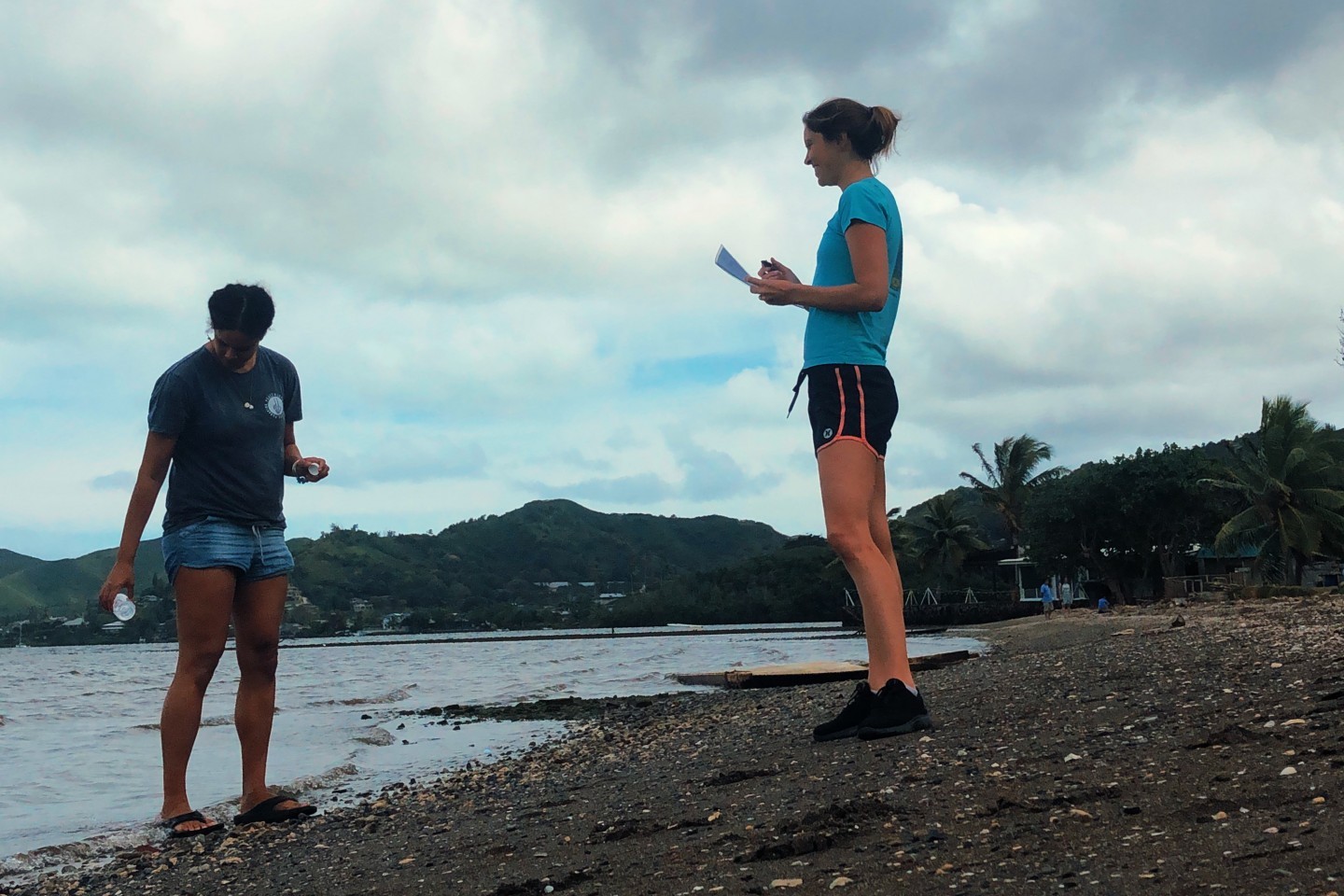
04.15.19
Activist Spotlight: Christina Comfort & Martina Duran with the Surfrider O'ahu BWTF
By Surfrider FoundationChristina Comfort and Martina Duran teamed up to revamp and relaunch the O’ahu Chapter’s Blue Water Task Force program in early 2018. Under their care and supervision, the program has grown into a solid citizen science program that is providing critical water quality information at 20 beaches around the island every two weeks.

Why and when did you get involved with the Surfrider Foundation?
Christina: I originally got involved with Surfrider by helping out with beach cleanups on O’ahu in 2015. There were lots of reasons I started volunteering with Surfrider. As a longtime ocean scientist and conservationist, I was well acquainted with the litter and plastics problem in our oceans and was eager to help clean up beaches around the island. I was drawn to Surfrider because of the varied types of advocacy and conservation opportunities the organization provides, including legislative action and water quality monitoring. Surfrider O’ahu is really committed to making a difference in our state and local government, and I was excited to learn how to take part and be a more effective citizen.
Martina: I was first introduced to Surfrider on a surf trip to Puerto Rico hosted by Earth Missions. While there, I met with Leon Richter, a member of the Rincon chapter of Surfrider (and who now chairs Surfrider’s Board of Directors), and he educated us about the Tres Palmas project and what his chapter did to save that break. It was the most moving story of local eco-activism that I had heard up until that point in my life. I was pretty hooked from that point on and decided to go to my local chapter meeting (the Suncoast Chapter in Florida at the time) when I got back from Puerto Rico. Shortly after I moved to O’ahu and joined the chapter here—and the rest is history!
 Martina records weather and beach observations on her sampling data sheet.
Martina records weather and beach observations on her sampling data sheet.
What are some local issues that are affecting your ocean, waves and beaches?
Christina: On O’ahu, island-generated litter and single use plastic pollution is common on some parts of the coastline, and globally generated plastic pollution that washes ashore is a problem too. Hawaii also has many cesspools which lead to sewage pollution in our nearshore ocean waters. Invasive species in the ocean and on land negatively affect our ocean environment.
On land, invasive plants and mammals destabilize the soil and exacerbate sediment flushing onto coral reefs during rain events. In the ocean, invasive fish prey on native juvenile fish, and invasive algae can smother coral reefs.
Martina: I think the biggest local issues threatening our beaches is plastic pollution. Because Hawai’i Is one of the most remote locations in the world, the people that live here don’t have the luxury to take on the “out of sight, out of mind mentality.” We see daily the trash and plastic pollution affecting our oceans. Some washes up from faraway places, and some is produced here. That is why it is so important we work on getting foam and single use plastic bans enacted.
What Surfrider projects have you worked on?
Christina: I have worked on beach cleanups, legislative campaigns, and Blue Water Task Force.
Martina: I worked on registering Ocean Friendly restaurants before moving on to co-chairing the Blue Water Task Force.
 Christina collects a water sample.
Christina collects a water sample.
What has been the highlight of your Surfrider experience?
Christina: Martina and I re-started the Oahu chapter’s BWTF in 2018, and it’s been a great experience getting the program up and running again and developing a long and consistent time series of data. Hopefully, these data can help identify priority areas that have the worst cesspool pollution issues and inspire effective legislative action to solve these waste management problems.
Martina: The highlight of my Surfrider experience has been watching our Ocean Friendly program grow from a simple idea, to a fully thriving program with 100+ restaurants signed on. It really showed me that it only takes one bright idea to ignite a movement.
What is the most important thing you tell others about Surfrider?
Christina: Surfrider is full of passionate conservationists who have a connection to the beach and ocean. There is a wide range of volunteer projects you can work on, and there are many ways for everyone to make a meaningful contribution to the protection of our ocean no matter your background or skill set.
Martina: The ocean cannot protect herself, it is up to us to be her steward. That is where Surfrider comes in. We are simply stewards of the most vulnerable, yet most essential and indispensable resource on our planet.
Why are you a Surfrider coastal defender?
Christina: I want to do whatever I can do help the ocean! I love that Surfrider not only cleans up the beach, educates the public, and monitors water quality, but also works with local businesses and the government with the goal of reducing problems at their source and making lasting change. The coastal ecosystem is important, beautiful, and fragile. It’s up to all of us to make sure that coastlines are protected, both for all the inhabitants of coastal ecosystems and for our human communities to enjoy sustainably.
Martina: I want to leave the world and ocean a better and cleaner place for the many generations that will come after me.
Learn more about the Oahu Blue Water Task Force program in this case study featured in Surfrider's 2018 Annual Clean Water Report. Or watch Christina explaining the program in this short clip that ran on local news stations.